|
|
|
Sort Order |
|
|
|
Items / Page
|
|
|
|
|
|
|
| Srl | Item |
| 1 |
ID:
134675


|
|
|
|
|
| Summary/Abstract |
The centenary of the outbreak of the First World War has so far produced a great deal of attention from scholars, history buffs, and policymakers alike. Much of this attention says more about attitudes in 2014 than the actual events of 1914. This essay explores ways to use—and not use—analogies to 1914 in discussing present-day policy problems. It demolishes some traditional ways of viewing 1914 and focuses on the unusual and unexpected set of circumstances in that fateful summer. The article concludes by discussing some of the dangers inherent in simplifying history and looks closely at the ways that historians tend to use the past to develop insights for the present.
|
|
|
|
|
|
|
|
|
|
|
|
|
|
|
|
| 2 |
ID:
135554


|
|
|
|
|
| Summary/Abstract |
What the British historian Eric Hobsbawm called “the long 19th century” ended 100 years ago, in 1914, in Sarajevo, with the two pistol shots that sparked World War I. Another historian, Fritz Stern, described that war as “the first calamity of the 20th century … the calamity from which all other calamities sprang.” These disasters included the Great War itself, which claimed some 20 million lives, including victims of the new century’s first genocide, in Turkey; the October Revolution in St. Petersburg, which gave birth to an ideological empire that would kill tens of millions of people and imprison hundreds of millions more; the rise of Nazism out of Germany’s defeat; World War II, with another 60 million deaths, including genocide on an unprecedented scale; the upheavals and wars beyond the borders of Europe that followed the end of colonialism; and the division of the postwar world into two nuclear-armed camps, which fought each other through proxies in post-colonial lands.
|
|
|
|
|
|
|
|
|
|
|
|
|
|
|
|
| 3 |
ID:
135594
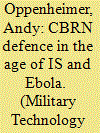

|
|
|
|
|
| Summary/Abstract |
Several conflicts, most notably in the middle east, are providing the backdrop for the first use of CBRN weapons in a generation. One hundred years after its first use of a chemical weapons (CW) in WWI effectively the world first weapons of mass destruction (WMD), chlorine gas in barrel bombs was air dropped on rebel-held areas in Syria.
|
|
|
|
|
|
|
|
|
|
|
|
|
|
|
|
| 4 |
ID:
135239


|
|
|
|
|
| Summary/Abstract |
Drawing analogies between the global political situation in 1914 and the present misses the point: From its outbreak to its conclusion, the Great War was defined by uncertainty and accident.
|
|
|
|
|
|
|
|
|
|
|
|
|
|
|
|
| 5 |
ID:
134512


|
|
|
|
|
| Summary/Abstract |
Middle Eastern Studies Vol.50, No.6; Nov.2014: p.1006-1026
|
|
|
|
|
|
|
|
|
|
|
|
|
|
|
|
| 6 |
ID:
135238
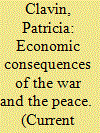

|
|
|
|
|
| Summary/Abstract |
The modern, globalized economy had emerged with vigor and reach in the nineteenth century, but was no more a guarantor of domestic or world peace after 1918 than it had been in 1914
|
|
|
|
|
|
|
|
|
|
|
|
|
|
|
|
| 7 |
ID:
135237


|
|
|
|
|
| Summary/Abstract |
]he war undoubtedly acted as a major catalyst to an aspect of the modern world we have seen time and time again, namely the mobilization of ethnic groups by great powers for their own geopolitical interests.
|
|
|
|
|
|
|
|
|
|
|
|
|
|
|
|
| 8 |
ID:
135227


|
|
|
|
|
| Summary/Abstract |
Although the prestige of European civilization suffered a body blow in World War I, it took most Europeans longer to realize that their continent was not the center of the world, and longer still to think of a war fought mainly in Europe as a truly global conflict.”
|
|
|
|
|
|
|
|
|
|
|
|
|
|
|
|
| 9 |
ID:
136305
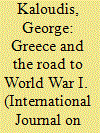

|
|
|
|
|
| Summary/Abstract |
The article, “Greece and the Road to World War I” by George Kaloudis, focuses on the nature of nation-state alliances and the configuration of great powers vs. smaller powers. It discusses the impact World War I had on a smaller state. Smaller states were lured into alliances with larger powers both for promises of protection and promises of a share of victory spoils. In the case of Greece, the war divided the nation internally as the king sided with the Central Powers while the democratically elected leader sided with the Allied Powers. The goals of modern democratic states are often determined by large institutional interests, rather than the head of state, as described by outgoing U.S. President Eisenhower’s famous warning about the “military-industrial complex.”
|
|
|
|
|
|
|
|
|
|
|
|
|
|
|
|
| 10 |
ID:
136509


|
|
|
|
|
| Summary/Abstract |
A century on, discussions about the Ottoman massacre of Armenians are still dominated by questions surrounding the use of one fraught and divisive word: “Genocide.” Washington should use the term but also recognize its many limitations. One hundred years ago this April, the Ottoman Empire began a brutal campaign of deporting and destroying its ethnic Armenian community, whom it accused of supporting Russia, a World War I enemy. More than a million Armenians died. As it commemorates the tragedy, the U.S. government, for its part, still finds itself wriggling on the nail on which it has hung for three decades: Should it use the term “genocide” to describe the Ottoman Empire’s actions toward the Armenians, or should it heed the warnings of its ally, Turkey, which vehemently opposes using the term and has threatened to recall its ambassador or even deny U.S. access to its military bases if the word is applied in this way? The first course of action would fulfill the wishes of the one-million-strong Armenian American community, as well as many historians, who argue that Washington has a moral imperative to use the term. The second would satisfy the strategists and officials who contend that the history is complicated and advise against antagonizing Turkey, a loyal strategic partner.
|
|
|
|
|
|
|
|
|
|
|
|
|
|
|
|
| 11 |
ID:
137052


|
|
|
|
|
| Summary/Abstract |
The need for Communications Intelligence in the Netherlands was first felt by the Dutch military as a consequence of the outbreak of the First World War. The decision to prolong, as in the Netherlands, or establish, as in the case of the East Indies, COMINT facilities belonged to the judicial domain and was primarily related to threats posed by revolutionary movements from within the country. The monitoring of traffic from foreign embassies or consulates happened only when interference from foreign governments was suspected. Japanese expansionism, leading to direct Japanese involvement in the political developments in the East Indies, provided such a case. As a consequence, the fine line between domestic and foreign affairs became thinner still until it entirely vanished during the later part of the 1930s.
|
|
|
|
|
|
|
|
|
|
|
|
|
|
|
|
| 12 |
ID:
135236


|
|
|
|
|
| Summary/Abstract |
Self-determination lacked legal standing in international law and remained ill-defined, and was thus open to appropriation and redefinition to suit diverse needs.
|
|
|
|
|
|
|
|
|
|
|
|
|
|
|
|
| 13 |
ID:
135817


|
|
|
|
|
| Summary/Abstract |
The state of the German Army’s morale in 1918 is central to our understanding not only of the outcome of World War I, but also of the German Revolution and, indeed, through the pernicious ‘stab-in-the-back-myth’, on Weimar politics and the rise of the Nazis, too. This article presents new evidence from the German archives, blended with statistical analysis, to show that the morale of some units held up better than previously thought almost to the end, and thus to suggest three things. First, it proposes that some historians have placed too much reliance on English-language sources alone, such as British Army intelligence reports, which have various flaws as evidence. Second, it argues that, while historians have increasingly moved away from generalisations about German morale, this process has further to run. Third, it suggests that no single tipping point can be identified, and that morale alone does not provide a sufficient explanation for battlefield defeat. Indeed, much of the data can only be explained if the tactical realities of the war in late 1918 are clearly understood.
|
|
|
|
|
|
|
|
|
|
|
|
|
|
|
|
| 14 |
ID:
135513
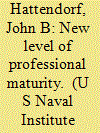

|
|
|
|
|
| Summary/Abstract |
In the wake of World War – I, the United States became an economic powerhouse. For many Americans, the 1920s was a decade of fabulous wealth, industrial expansion, and new consumer market fro automobiles, radios, movies and photographs records.
|
|
|
|
|
|
|
|
|
|
|
|
|
|
|
|
| 15 |
ID:
134903


|
|
|
|
|
| Summary/Abstract |
This article challenges the standard narrative of interwar U.S. involvement in the Middle East by arguing that the United States did have both interests in and a policy concerning Iraq during that time. Despite being non-belligerents with the Ottoman Empire during the First World War and non-members of the League of Nations thereafter, the U.S. government consistently advanced the claim that the American contribution to the Allied victory entitled it to equal political and economic opportunities in the Middle East and to a voice in postwar Middle Eastern affairs. U.S. officials vigilantly intervened in the region throughout the period to ensure not only American access to petroleum resources, but also, as is shown in Iraq, to insist on political relations unmediated by Great Britain. British acceptance of this implies that the foundations had thereby been laid for an independent American role in the Middle East, preceding the later thresholds usually cited by historians. The open door policy the U.S. government set out in the correspondence with Britain in 1920–21 represents a full and cogent policy on Iraq that was advanced throughout the interwar period to protect American interests and standing in that country.
|
|
|
|
|
|
|
|
|
|
|
|
|
|
|
|
| 16 |
ID:
134676
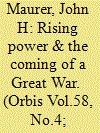

|
|
|
|
|
| Summary/Abstract |
This article examines the strategic decisions that led to the struggle between Britain and Germany, exploring how a great war involving Europe's leading powers could come to pass. In 1914, there were no forces beyond the control of decision makers pushing them into the grisly war of attrition that destroyed the social and political fabric of nineteenth-century Europe and ushered in the horrors of the twentieth century. Rather, those horrors resulted from poor policy and strategic choices made by the leaders of the great powers. The war's outbreak underscores history's contingent nature, dramatically showing how errors in judgment on the part of political and military leaders can ruin great countries. One stark lesson of the Great War is that no leader sought as an outcome the conflagration produced by their decisions. Today, China's weapons programs and foreign policy assertiveness conjures up fears that Beijing seeks to establish a new international order, much as Germany's rulers tried to do a hundred years ago with such catastrophic consequences. Shaping the internal debate among China's rulers, so that they judge self-restraint in armaments and strategy as being in their best interest, will test the strategic acumen of American leaders in the years ahead.
|
|
|
|
|
|
|
|
|
|
|
|
|
|
|
|
| 17 |
ID:
135977


|
|
|
|
|
| Summary/Abstract |
In early 2014, the Theatre Royal Stratford East presented a revival of Oh! What a Lovely War, Joan Littlewood's famous musical about the First World War. Michael Codner looks back at the musical's sources, with an overview of a century of popular music and soldiers’ songs, recalling both their humour and their bleakness.
|
|
|
|
|
|
|
|
|
|
|
|
|
|
|
|
| 18 |
ID:
136287


|
|
|
|
|
| Summary/Abstract |
Understanding the Islamic State in Iraq and Syria (ISIS) presents a number of problems. The immediate origins of the Islamic State in Iraq and Syria (ISIS) lie in the opportunity spaces provided by two bitter civil wars that challenged the exiting states system and borders created by the Sykes-Picot Agreement of World War – I; the bloody Sunni-Shia civil war in Iraq that followed the US overthrow of Saddam Hussein in 2003, and the even more horrific civil war that has been raging in Syria since 2011.
|
|
|
|
|
|
|
|
|
|
|
|
|
|
|
|
|
|
|
|
|